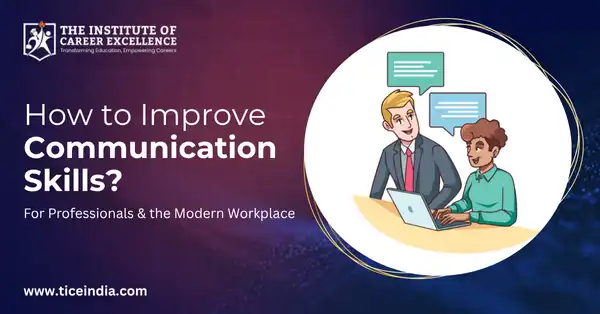
Posted On: July 21, 2025
How to Improve Your Communication Skills? For Professionals & At Workplace
The way we communicate with others and with ourselves ultimately determines the quality of our lives." This powerful insight from Tony Robbins perfectly captures why mastering communication skills isn't just beneficial—it's essential for professional success.
Having spent the last ten years at the intersection of technology and performance marketing, I've witnessed firsthand how effective communication can make or break careers. Whether you're presenting to clients, leading a team, or even teaching students at our digital marketing institute in Kolkata, your ability to communicate clearly determines your impact.
The Communication Crisis in Modern Workplaces
Let's start with some eye-opening statistics that highlight the importance of learning how to improve your communication skills:
- 86% of employees blame poor communication for workplace failures
- Poor communication costs businesses $1.2 trillion annually
- 43% of survey respondents have experienced burnout, stress, and fatigue due to workplace communication issues
These numbers paint a clear picture: communication isn't just about exchanging information—it's about creating understanding, building relationships, and driving results.
What Are Communication Skills?
Communication skills encompass your ability to convey information effectively and receive it accurately. They involve four core elements:
- Listening: Understanding what others are saying
- Speaking: Articulating your thoughts clearly
- Observing: Reading non-verbal cues
- Empathizing: Connecting with others' perspectives
Let me share a practical example from my experience at TICE. During our digital marketing course in Kolkata, I often encounter students who struggle to present their campaign ideas. Those who master these four elements consistently outperform their peers in both presentations and client interactions.
Why Communication Skills Matter in Professional Life
The statistics speak volumes about the business impact of effective communication:
- Business leaders cite heightened customer satisfaction (51%), improved brand reputation (45%), successful business deals (43%), and cost reductions (33%) resulting from effective communication
- Effective team communication increases employee retention by 4.5 times compared to workplaces without an effective communication strategy
Nine Key Benefits of Strong Communication Skills:
- Better Collaboration and Teamwork: Clear communication eliminates confusion and aligns team efforts
- Enhanced Problem-Solving: Open dialogue leads to innovative solutions
- Improved Leadership Abilities: Leaders who communicate well inspire trust and motivation
- Stronger Client Relationships: Understanding client needs builds lasting partnerships
- Accelerated Career Advancement: Effective communicators are noticed and promoted
- Expanded Networking Opportunities: Good communication opens doors to new connections
- Reduced Misunderstandings: Clear messaging prevents costly errors
- Enhanced Professional Image: Confident communication projects competence
- Superior Customer Service: Understanding and addressing customer concerns builds loyalty
The Four Types of Communication Skills
1. Verbal Communication
This includes face-to-face conversations, phone calls, and presentations. Key skills include clarity of speech, appropriate tone, and engaging delivery.
2. Non-Verbal Communication
Over three-quarters (77.3%) of workers said that digital communication tools improved their productivity, but non-verbal cues remain crucial. Body language, facial expressions, and gestures often communicate more than words.
3. Written Communication
With the average person receiving around 121 emails a day while sending closer to 40, written communication skills are more important than ever. This includes emails, reports, and digital messaging.
4. Listening Skills
Active listening deserves special emphasis. 84% of employees rely on managers for communication to some degree, making listening a critical leadership skill.
How to Improve Your Communication Skills: Practical Strategies
Enhancing Verbal Communication
Techniques for Clear Communication:
- Practice slow, deliberate speaking
- Use tongue twisters to improve pronunciation
- Record yourself speaking and identify areas for improvement
- Read aloud regularly to build confidence
- Seek feedback from colleagues and mentors
Understanding Tone Impact: Your tone can make or break your message. Match your tone to your content—serious topics require serious tones, while lighter subjects can be delivered with warmth and enthusiasm.
Public Speaking and Presentations:
- Know your audience's background and interests
- Organize content with clear introductions and conclusions
- Practice extensively to build confidence
- Engage your audience through questions and interaction
- Manage anxiety through preparation and breathing techniques
Developing Non-Verbal Communication
Understanding Body Language:
- Study common gestures and their meanings
- Observe others in various professional settings
- Reflect on your own habitual non-verbal signals
- Consider cultural contexts when interpreting body language
Professional Body Language Tips:
- Maintain open posture (uncrossed arms, facing your audience)
- Use controlled gestures to emphasize points
- Subtly mirror the body language of your conversation partner
- Respect personal space boundaries
- Practice a firm, confident handshake
Improving Listening Skills
Effective listening is where many professionals struggle. Here are ten practical tips:
- Give your full attention—eliminate distractions
- Show you're listening through nodding and eye contact
- Reflect back what you hear to confirm understanding
- Ask open-ended questions to encourage elaboration
- Avoid interrupting, even when excited to respond
- Respond appropriately with relevant feedback
- Use verbal affirmations like "I understand" or "That makes sense"
- Match your facial expressions to the conversation
- Don't jump to conclusions before the speaker finishes
- Avoid making assumptions about the speaker's intent
Mastering Written Communication
In our digital age, written communication skills are paramount. Consider these strategies:
- Be clear and concise: Avoid jargon and unnecessary complexity
- Know your recipient: Tailor your writing style to your audience
- Use appropriate tone: Match formality to context
- Stay on topic: Focus on your main message
- Use active voice: "The team completed the project" instead of "The project was completed by the team"
- Structure for clarity: Use headings, bullet points, and short paragraphs
- Always proofread: Check for grammar, spelling, and clarity
Communication Skills for Job Interviews
Strong communication skills are especially crucial during job interviews. Here's how to excel:
- Prepare thoroughly: Research common questions and practice responses
- Use the STAR method: Structure behavioral answers with Situation, Task, Action, Result
- Manage your body language: Maintain eye contact, sit up straight, use purposeful gestures
- Listen actively: Don't just wait for your turn to speak
- Ask thoughtful questions: Show genuine interest in the role and company
- Be honest: Authenticity builds trust with interviewers
FAQs
What are the 5 ways to improve your communication skills?
The 5 ways to improve your communication skills are:
- Practice active listening
- Seek feedback regularly
- Read and write more
- Join speaking groups like Toastmasters
- Observe and learn from effective communicators
What are the 7 C's of communication skills?
The 7 C's are: Clear, Concise, Concrete, Correct, Coherent, Complete, and Courteous.
What are the 5 basic communication skills?
The 5 basic communication skills are:
- Listening
- Speaking
- Reading
- Writing
- Non-verbal communication
How can I be a better communicator?
Focus on understanding before seeking to be understood, practice regularly, and remain open to feedback and improvement.
The Digital Marketing Connection
Throughout my experience leading TICE and working with countless professionals, I've observed a strong correlation between communication skills and success in digital marketing. Students who excel in our programs often share common traits: they listen to client needs, articulate strategies clearly, and adapt their communication style to different audiences.
The SEO Career Path requires particularly strong communication skills—from client presentations to team collaboration and content creation. This is why we emphasize communication training alongside technical skills in our curriculum.
Conclusion
Learning how to improve your communication skills is a journey, not a destination. The statistics show that poor communication costs businesses trillions annually, while effective communication drives customer satisfaction, brand reputation, and business success.
Whether you're a seasoned professional or just starting your career, investing in communication skills will pay dividends throughout your professional life. Remember, every interaction is an opportunity to practice and improve.
At TICE, we believe that technical skills combined with strong communication abilities create unstoppable professionals. If you're looking to advance your career while developing these essential skills, consider exploring our comprehensive training programs.
The future belongs to those who can not only think clearly but also communicate their ideas effectively. Start improving your communication skills today, and watch how it transforms your professional relationships, career prospects, and overall success.
Tags
Latest Posts
-

Best Certification Courses After 12th for a Career in IT
-

What is Off-Page SEO Optimization? Complete Guide to Building Authority and Rankings
-

What is On-Page SEO? Techniques, Factors, Elements
-

10 Best SEO Keyword Research Tools in 2025 (Free & Paid)
-

All Types of Keywords in SEO With Examples (2025 Guide)
Similar Posts
-

What is Off-Page SEO Optimization? Complete Guide to Building Authority and Rankings
-

What is On-Page SEO? Techniques, Factors, Elements
-

10 Best SEO Keyword Research Tools in 2025 (Free & Paid)
-

All Types of Keywords in SEO With Examples (2025 Guide)
-

How to Learn SEO in 2025: Step-by-Step Guide for Beginners



